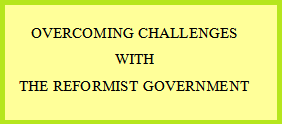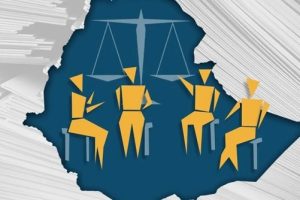
In the recent extraordinary interview Prime Minister Abiy Ahmed ( PhD) has held EBC, he dwelt on with many issues of concern to the public. He outlined what the major challenges his government had to face and how he managed to overcome those obstacles continuing to be faithful to his original plans and programs going forward.
The first problem that he had to pass through was the old mentality among leaders of opposition parties that believed that the highest office of government could be attained through armed struggle or violence instead of going through all the steps that a democratic process might involve. It was evident that there was no such preparation to face such a process by all those who had hoped to come to Ethiopia from abroad and be leaders at home right away.
He first condemned the mentality and belief that in Ethiopia power could be only by force. The old idea or idea of taking arms against the incumbent and defeat it through protracted violence and hostilities was to be undone because it would have led the country to interminable violence and consequent chaos as experienced many times in Ethiopia’s recent history. Such a mentality, the premier stated that it is still something to fight against because it misleads people, particularly the youth with the wrong narratives and continues to engulf the country in a vicious circle.
Furthermore, the reformist government had to pass through a series of challenges that were aimed to either uproot it or sabotage whatever programs it had to champion and obtain the acceptance of citizens. There were attempts to destabilize the country by disseminating inflammatory rhetoric and narratives so that the reformist government would be undermined or dismissed as authoritarian. The government’s actions were to be rejected insisting that the newly sworn in prime minister was trespassing his constitutional powers by dissolving the deposed EPRDF and substituting it with a new party called Prosperity Party. This was regarded by those who hesitated to accept the authority of the new government and began to challenge it in every aspect they deemed fit.
However, the premier said the new administration was not discouraged nor weakened and continued with the reforms according to its initial promises and pledges. The government had clear programs and clear targets and the way was clearly outlined and the objectives were well set and there was nothing that could be taken as haphazard programs or measures adopted by the new government.
Challenges to the peace and security of the country were attempted by trying to destabilize it and creating an atmosphere of fear and anxiety among the nationals. Attempts to depict the government as incapable of guaranteeing the peace of the country were disseminated through social media as well by igniting violence here and there thus belittling the capacity of the new government and creating a sense of anxiety and worry among the population. A propaganda campaign was launched by the ‘opposition forces’ spinning these developments. But the response of the government was swift and firm. In due time, it continued to galvanize power and proceed with its programs undistracted by the unsettling states of affairs provoked here and there.
The premier emphasized that power could be taken only through democratic processes in a legal and constitutional manner. He dismissed as hopeless all those forces which are trying to depose the legitimately elected government by force. At times, he noted, there are indications that these forces benefit from the collaboration and encouragement of foreign enemies of Ethiopia which have their own agenda to (derail) from its trajectory of progress and growth.
During the interview, the premier reiterated warning and recommending that there was no means of seizing power by force and the only means advised is to use constitutional channels by organizing legal parties and campaign with political platforms and programs. All the remaining means are useless and vain, he pointed out, because the status quo of the constitutionally elected government is not permissive to such delusions at any rate. He talked about the advanced and sophisticated preparedness of the army and other law enforcement bodies capable of foiling any form of aggression from whichever direction it might come. Nevertheless, attempts have not stopped from taking place and try to beleaguer Ethiopia from multiple directions by various armed groups and even using technological warfare by trying to sabotage Ethiotelecom structure and its cyber security apparatus. But they were all reversed and foiled by the active vigilance and supervision of the Ethiopian government using its advanced technological capability.
Ethiopians today do not accept a government that does not work to realize their aspirations and prospects by addressing their urgent needs. People want to choose their own representatives and leaders through free and fair electoral process legally and be properly administered with transparency and accountability. Taking power by force cannot be qualified as democratic and we have seen in the past not only in Ethiopia but in many other countries as well that power taken by force has not led to stability and peace. Countries which submitted to such a phenomenon have unfortunately remained in chaos and instability forcing their people to suffer in poverty and oppression with no human rights and no rule of law observed.
A government that comes to power through the use of force can only remain in power by constantly using force to subdue the population to accept its dictates and unfair policies. Such governments worry only to remain in power at all costs which in due course results in unnecessary sacrifices against the people.
The premier did not believe that everything went smoothly and there were ups and downs during the past seven years of this administration. However, immense strides have been made to change the country for the better and inculcate ideas of democracy more extensively than ever before with the formation of several independent institutions. People may not always be satisfied by what measures the government may stabilize the economy. The economic reform could be described as one of the biggest challenges the country had to face because the country was debt ridden and it had to come out of that abyss.
It was not capable to pay its debts in time which meant that it could not continue to borrow more, and yet it needed these resources from foreign sources so that it could go ahead with its programs of growth. Hence, the government had to find means of addressing this issue. The Home Grown Economic Reform, he noted, was not imposed on Ethiopia by any international financial institution, be it the IMF or the World Bank Group as was narrated by certain groups.
The truth is that Ethiopia prepared its own customized programs and got the approval of these bodies after they were convinced by our government. The reform was implemented among other things by adjusting the real value of the birr as opposed to hard currency. The fact that the Ethiopian birr was overvalued had affected negatively foreign investment and international transactions. The economy was on the verge of bankruptcy and banks were in full crisis risking total collapse with unpredictable consequences.
The government had to take severe measures in this sense and having identified inflation as a major challenge. It had to take appropriate measures to put a halt to this dangerous state of affairs. Inflation has been a common ailment of Ethiopia’s economy for decades but it should have been taken care of by continued and adequate growth of the economy. It is hoped that the current pace of decreasing the growth of inflation will continue unabated going ahead if the economy continues to grow smoothly.
However, the premier noted that the biggest challenge Ethiopia faces was and still is that it had become a ‘prisoner of geography’ or was geographically confined away from access to sea. He said it was unthinkable that a country the size of Ethiopia and a vast population of 130 million with the current annual growth of about 8% annually should be condemned to be landlocked while there are thousands of kilometers of sea access just a few kilometers off its border. The premier insisted that Ethiopia had a right to seek access to sea legally and with diplomatic and peaceful means, without causing harm to anyone. The Convention on the Seas allows it to seek and secure access to sea legally fulfilling the required conditions with its neighbours and without resorting to force.
This is just as the building of the Grand Ethiopian Renaissance Dam, GERD, which was at the beginning inconceivable, but now it is finished thanks to the commitment and perseverance of the Ethiopian people and its assertion of its rights to utilize its resources without harming downstream countries. In the meantime, the premier has announced that the inauguration of the Dam is imminent.
This process should also be replicated with Ethiopia’s need and determination to have access to sea in a diplomatic and legal manner based on the principle of give and take. This approach has been accepted and supported by many countries, not only partners and allies of Ethiopia. In fact, it is to be remembered that Ethiopia was condemned to be landlocked because of certain naïve blunders committed by past governments and this has to be rectified also because Ethiopia cannot be a stable and peaceful country without having access to sea and continue to grow taking care of its population. Access to sea would be a key not only for Ethiopia’s economic growth but will also have good effect and results to its neighbours. With better trade and commercial relations with neighbours, access to sea for Ethiopia creates a win-win situation for all the countries adjacent to Ethiopia and we can grow together. For Ethiopia it is also a matter of national security because Ethiopia needs to know what is going on the Red Sea and the Gulf of Eden because anything negative that may happen there will have ramifications that could involve the country’s national sovereignty.
Furthermore, talking about some of the achievements of his government and party, PM Abiy Ahmed said that he was in general satisfied with the good beginning which was very difficult and dangerous but somehow the hardest part may have been surmounted even if there are still immense challenges going forward.
In a nutshell, the prime minister depicted a promising and hopeful Ethiopia which thanks to the efforts of his government as well as the general reaction of citizens who accepted and collaborated with it, was materialized. The activities that were meant to be carried out ended successfully as per the pledges made by the party, the premier noted.
He gave credit to all those who helped the country reach the current state which he described as outstanding and admirable. He said the reforms have been well received by countries that supported his party’s programs and the way things were proceeding towards the set objectives. There have been several debates and discussions among the officials of his party and the government authorities as well as the public in general before introducing many of the policies and the measures taken to implement them.
BY FITSUM GETACHEW
THE ETHIOPIAN HERALD SATURDAY 14 JUNE 2025



